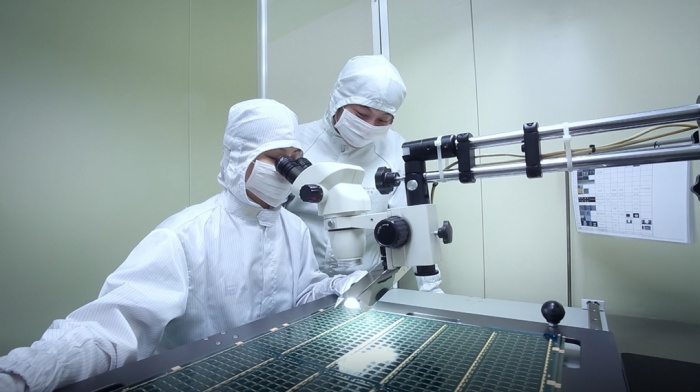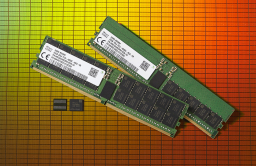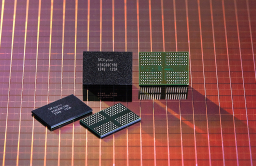-
KOSPI 2812.05 +41.21 +1.49%
-
KOSDAQ 756.23 +6.02 +0.80%
-
KOSPI200 376.54 +6.64 +1.80%
-
USD/KRW 1373 3.00 -0.22%
Small-size PCB makers in expansion mode to meet demand
Simmtech and Daeduck Electronics made facility investments twice this year, with PCB prices up 20-30%
By
Sep 29, 2021 (Gmt+09:00)

The growing demand for larger-size printed circuit boards (PCBs), used to connect chips to the circuit boards of electronic devices, has been pushing South Korea's small PCB manufacturers to expand production lines for almost a year.
Amid the working-from-home and non-contact trends, the popularity of high-performance personal computers and mobile devices created demand for larger PCBs. The prevalence of the 5G mobile network, which boasts faster speeds than 4G, is behind the demand for high-performance electronic gadgets as well.
Producing larger-size PCBs means a reduced output from the existing production lines and delayed shipments, driving the average price of PCBs by 20-30% so far this year.
"We could not help but make additional investments to meet the rising demand," a Simmtech official recently told The Korea Economic Daily. "Once our facility expansion is completed, our production capacity will increase by more than 20% compared to the beginning of this year."
Simmtech Co. had announced facility investment plans twice this year -- in February and August -- for a combined 70.5 billion won.
The new spending is being pumped into expanding its production lines in Cheongju, 112 km from Seoul, for high-density PCBs. They include the substrates manufactured in the modified semi-additive process (mSAP) for the types of a system in a package (SiP) and a flip chip-chip scale package (FC CSP).
The mSAP is expected to be widely adopted in the packaging of advanced high-density interconnect (HDI) PCBs, which make more room on the circuit boards to make them more efficient and allow for faster transmission.
SiP refers to a process of mounting multiple integrated circuits and passive components in a package. PCBs made through the FC CSP process are mainly used in application processor (AP) chips of mobile devices.
"On top of the rising demand for PCBs, they are getting bigger in size to meet the demand for a greater density of connections and more layers in the PCBs," said Choi Do-yeon, a Shinhan Financial Corp. analyst. "That resulted in the output cuts."
With the pace of orders placed outrunning that of product shipments, Daeduck Electronics Co. had announced much larger investment plans than its bigger rival Simmtech's this year. It earmarked a combined 160 billion won for facility expansion this year.
"We will generate an additional 300 billion won per year from new (PCB) shipments from 2024," said its Chief Executive Shin Young-hwan.
Both Simmtech and Daeduck are trailing bigger rivals LG Innotek Co. and Samsung Electro-Mechanics Co., which are the country's largest PCB makers.

IMPACT OF FIRES AT UNIMICRON'S PCB PLANTS IN TAIWAN
Simmtech is also filling the void left by Unimicron Technology, after the fires at the world's third-largest chip PCB manufacturer's manufacturing complex in November 2020 and February of this year.
Simmtech is ramping up production of the FC CSP-type substrates commonly used for application processors. The company is expected to achieve its best annual operating profit of 136.8 billion won this year, up 53% year-on-year. Its sales are forecast to rise 8% year-on-year to 1.3 trillion won this year.
Daeduck's 2020 operating profit will likely come to 59 billion won, more than 20 times the previous year's 2.7 billion won, based on the consensus forecast by analysts. Sales are expected to surge by 56% to 970 billion won this year from the year before.
The global PC market this year is projected to expand at a faster pace of 18.3% than the previous year's 12.9%. That compared with the average annual growth of 1% between 2016 and 2019.
PCB prices went up by over 10% on average in the first and second quarters of this year, with the estimated shipping time extended to 24 weeks or longer after an order is placed, compared to the previous four weeks.
The PCB market is expected to remain buoyant until next year as the supply shortages show little signs of easing, said Samsung Securities analyst Lee Jong-wook.
Write to Byung-keun Kim at bk11@hankyung.com
Yeonhee Kim edited this article.
-
 [Exclusive] Semiconductors[Exclusive] Samsung to make Tesla’s HW 4.0 self-driving auto chip
[Exclusive] Semiconductors[Exclusive] Samsung to make Tesla’s HW 4.0 self-driving auto chipSep 23, 2021 (Gmt+09:00)
-
Jul 30, 2021 (Gmt+09:00)
-
Jul 27, 2021 (Gmt+09:00)




